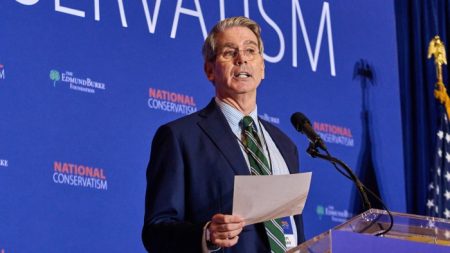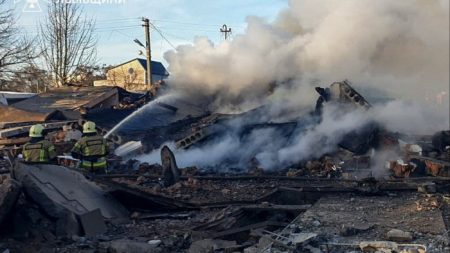Unlock the Editor’s Digest for free
Roula Khalaf, Editor of the FT, selects her favourite stories in this weekly newsletter.
Bangladesh’s Prime Minister Sheikh Hasina has resigned, a senior military official has said, after thousands of protesters descended on the capital demanding her ousting in a dramatic culmination of weeks of demonstrations.
Bangladesh army chief Waker-Uz-Zaman said in a televised address on Monday that the military would begin talks to form an interim government.
Sheikh Hasina, who has ruled the country of 170mn for a total of two decades, has faced growing popular anger. She was re-elected to a fifth term earlier this year after authorities rounded up thousands of members of the main opposition party, which boycotted the vote.
Student protests that started last month against a job quota system have escalated into a broader uprising against Sheikh Hasina after a crackdown by authorities, killing as many as 300 people.
Almost 100 people were killed over the weekend alone as protesters clashed with police and supporters of Sheikh Hasina’s Awami League party. Demonstrators on Monday defied a military-backed curfew, marching on Dhaka, the capital, and storming her residence after she fled, according to local media.
The daughter of Bangladesh’s independence leader Sheikh Mujibur Rahman, Sheikh Hasina presided over the world’s eighth-most populous country with an increasingly autocratic hand.

Her government backtracked on the quota scheme, which reserved a third of government jobs for family members of veterans of the country’s 1971 independence war with Pakistan — after facing mass resistance. But the protests, supported by students and ordinary citizens, had by last weekend expanded into a broader movement demanding Sheikh Hasina’s resignation.
“We call upon the free world, the United Nations and in fact the world as a whole to immediately support our one-point demand, which is the resignation of Sheikh Hasina,” Abdul Kader, convener of Students Against Discrimination, declared in a statement released ahead of Monday’s mass protests.
Witnesses in Dhaka said large crowds confronted security forces as thousands poured into the capital.
Her resignation will be a blow to the government of neighbouring India, south Asia’s largest economy, whose leader Narendra Modi valued Sheikh Hasina as a crucial ally.
Bangladesh is also the world’s second-largest garment exporter, and a critical low-cost manufacturing centre for western brands including Walmart, Primark and H&M.
“It’s a fork in the road for Bangladesh,” Sayem Faruk, an entrepreneur taking part in Monday’s protests, told the Financial Times by telephone.
Read the full article here












